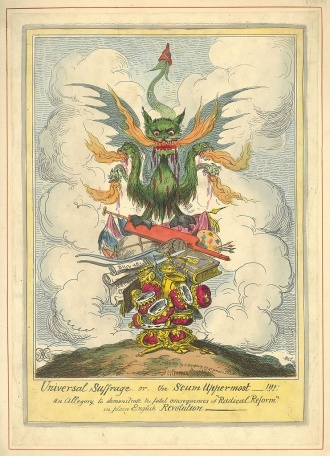This is the last article you can read this month
You can read more article this month
You can read more articles this month
Sorry your limit is up for this month
Reset on:
Please help support the Morning Star by subscribing here
Disrupt? Peterloo and Protest
People's History Museum, Manchester
2019 marks 200 years since over 60,000 people marched from miles around to St Peter’s Fields in central Manchester demanding democracy. Instead they faced death and serious injury.

As part of a year commemorating that bloodstained event, the free exhibition Disrupt? aims to tell the story of the Peterloo Massacre and to point up its contemporary relevance by “examining issues within our democracy that people are campaigning for 200 years on.”
Among the portraits, banners and artefacts on show — many of them previously unseen or rarely so — are a George Cruikshank cartoon Universal Suffrage or the Scum Uppermost, produced just before Peterloo, with the working classes demanding democracy depicted as a many headed-monster astride the institutions of royalty and the arts.
Also on show is the 1819 Skelmanthorpe Flag, which links up the Peterloo protest with the movement to abolish slavery, yet, surprisingly, the female reform societies who played a small but significant role at Peterloo are represented solely by the dress of a female shopkeeper not involved on the day. Their eloquent public addresses by those women are conspicuous by their absence.
Dominating the exhibition is a large screen where a short film recounts what happened on the day by using clips from Mike Leigh’s film Peterloo. Numerous talking heads have their say, from the obvious — Maxine Peake and historian Robert Poole — to the obtuse — TV presenter Krishnan Guru-Murthy and the Guardian’s Kathleen Viner.
Politicians are represented by local Labour MP Angela Rayner but glaringly absent is anyone from a present-day campaign for social justice. Instead, Manchester police chief Tariq Butt comments that policing has changed since 1819 — I’m not so sure that the Orgreave miners or the families of the Ballymurphy 11 would agree.
Though the exhibition curators declare that they want it to examine issues of democracy today, the protests in the city at the time I visited of striking RMT workers or the children demonstrating against climate change — who flooded out St Peter’s Square — do not get a mention.
Instead, ignoring what’s happening in the real world outside, a large part of the exhibition is given over to a “protest lab” where would-be activists can learn how to make a placard or a banner.
As Manchester has become dominated by corporate buildings and luxury flats, the annual Peterloo commemoration has become an adjunct to the city’s heritage industry, diluting and sanitising its real message of protest and class struggle.
This exhibition is not going to challenge that revisionist narrative.
Runs until February 23, 2020, opening times: phm.org.uk











